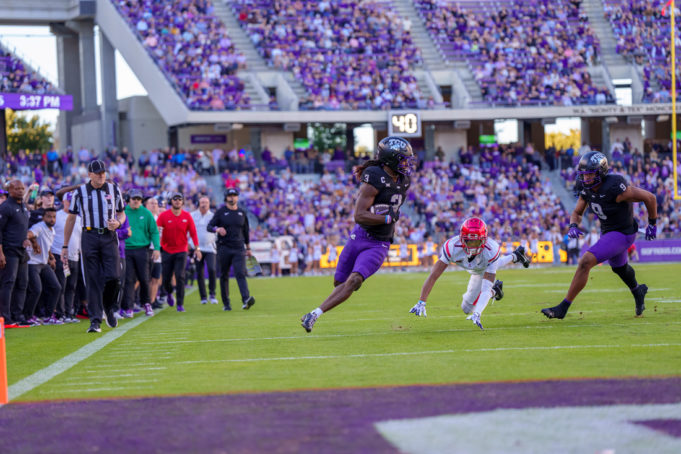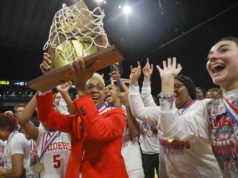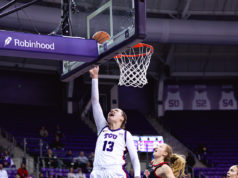Here’s what I wrote before the season began three months ago: “This season’s resetting of expectations for Frog faithful should leave fanatics primed to consider a seven- or eight-win season from the Frogs a hopping success.” It doesn’t really feel like it, though, does it?
It’s appropriate enough that Thanksgiving is supposed to be a season of reflection and thanks for the blessings we have, not of how much better things can be, but forget that noise. Stay bitter, Frog Nation, because this season should have been better, much better, and we’re going to discuss why.
Saturday’s spat with Arizona, much like the Frogs’ last game against Oklahoma State, went off mostly without dramatic trepidation for local faithful as TCU rolled up more than 450 yards of offense en route to 49 points. Andy Avalos’ defense intercepted the ’Zonies on the first play of the game and promptly produced points. Despite the Wildcats’ kicker keeping his team in the game throughout the first half, a TCU score before the break and four consecutive offensive drives for touchdowns coming out of the locker room provided a mostly celebratory senior day for the home crowd. QB Josh Hoover tossed one interception in the first half, and backup quarterback Ken Seals suffered a strip-six in garbage time to make the final score seem somewhat more respectable for the visitors at 28-49.
This leaves the Frogs at 7-5, bowl eligible, and on the precipice of an eight-win season if they can handle the Cincinnati Bearcats on an early Saturday evening in Ohio. The ’Cats will be fighting to become bowl eligible as they’re currently 5-6 and have dropped four in a row. If TCU has proved nothing else over the past two weeks, it’s that they’re capable of extending a poor team’s losing streak. But the overarching question remains. What could have been this season?
Avalos, who is in his first campaign, has shown consistent scheme and execution improvement as the defense continues to tackle more effectively, produce pressure, and force turnovers. Offensively, the early part of this season has been classic Kendal Briles: produce a boatload of stats while losing.
The most effective adjustment in hindsight was moving Savion Williams from an occasional wildcat quarterback to a full-time running back along with additional duties. Williams has passed, thrown, and run for touchdowns this season (two on Saturday). The Frogs rushed for five total scores against Arizona, none of which were from Hoover being ramrodded into the endzone, which is an accomplishment for this team all its own. But, knowing what we do now, this season could and should have been so much more.
The Big 12 is a college football case study in mediocrity right now. The top four teams all have two conference losses, and the next five, including TCU, have three. The conference was wide open for the taking this year, and the Frogs had one of the easier paths to rumble through with minimal damage, but an epic meltdown against UCF and a performance flatter than the Midland-Odessa landscape while hosting Houston has left TCU watching a probable championship game between Arizona State and *chokes back vomit* Colorado?
Soberly, college football is no longer a sport of year-to-year improvement, where a young team with good prospects is expected to bring their experience back to do better in a follow-up campaign — that just isn’t how things work anymore. You have to win with what you have and hope to retain players and add talent through the transfer portal while shoveling NIL money into the fire. Most of TCU’s key production pieces have two games remaining. Williams and Jack Bech will be on NFL rosters this time next year. The eligibility of elder statesmen JP Richardson (who logged his second consecutive 100-yard receiving performance, against Arizona) will expire, and he has professional-level potential as well. The running-back room is young, but none of them were particularly effective before Williams joined the rotation. Eric McAlister hasn’t given any indication he’ll fly the coop, but you never know, and he should be the highlighted target for Hoover next season. This receiving corps is and was tremendously talented and could have delivered a better season if adjustments by this coaching staff had been successfully implemented earlier, most specifically Williams as a running back.
In an ironic twist of fate, SMU was the best team the Frogs lined up across from all season. The Ponies lost a close game to BYU but are unblemished otherwise and currently ranked 13th. They’ve clinched their spot in the ACC title game against either Miami or Clemson. This means they control their destiny in achieving a playoff berth, even if the committee would rather they not be included.
TCU lost to SMU by 24 points in a game in which the Frogs committed five turnovers. The Frogs fell to Houston by 11 after losing the ball four times. Both losses against Baylor and UCF were clean, zero turnovers, and short of paydirt by a combined four points. TCU’s ball security has improved in the latter half of the season — two lost over the last three games — but was bad enough early that the Frogs are still 120th in the nation in turnover margin and dead last in the conference.
It wouldn’t be the first time I’m a victim of past-me’s advice, but it’s apropos to heed it now as much as ever: Frog fanatics should be grateful for a winning season, perhaps even excited about the future, but it’s always human nature to ponder how much better things could have been, and they could have — nay, should have — been much better than this.












